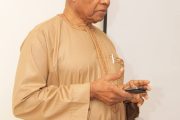Civil society platforms are warming up for action against the latest hike in the prices of petroleum products from the N123 50 pump price at most filling stations to N143. The Joint Action Front (JAF) and the Civil Society Legislative Advocacy Centre, (CISLAC) have each rejected the hike, saying, in the case of JAF, that “This is coming against the background of serious hardship the working people and oppressed masses are going through, following the failure of the Nigerian State to provide adequate social support and access to mass testing in the face of threats to survival by the Coronavirus pandemic”
JAF said it has consistently maintained that the current unjust system of neoliberal order is incapable of addressing the quest of Nigerians for free education, free healthcare, jobs for all and security of life and properties, hence its insistence on changing the social system in favour of “a socio- economic arrangement that can guarantee provision of basic necessities to ALL”.
It is subsequently calling on organised labour to provide leadership for resistance against what it regards as IMF inspired hike in fuel prices, urging Nigerians to prepare for consistent resistance against attacks on jobs, education, healthcare, high cost of living and on the urgent necessity to mobilise towards a new political alternative, falling back on its slogan of ‘dare to struggle, dare to win”.
CISLAC, on its side, is calling on the government to initiate actions aimed at cushioning the shocks of hardship, calling it a very big disappointment to see the Nigerian Government increase cost of living at a time of what it describes as unprecedented socio-economic impact of the Covid-19 pandemic.
It is lumping recent announcement by the electricity distribution authorities to increase electricity tariff and the latest Government’s pronouncement to increase fuel pump price, describing them as clear indications of total disconnect between Government and the people.
“We are surprised that, in spite of whopping, unaccounted domestic and foreign donations to support and rescue the country as well as reported repatriation of huge, looted sums to the nation’s treasury, the Government has not devised adequate measures to mainstream the funds in re-financing deficit in its budget”, said CISLAC. It is putting this to what it sees as the biggest challenge with political office holders in Nigeria, that being the ability to recognize the fact that they are serving the people, the citizens on the basis of trust.
Other charges levelled against the power elite, especially those in government are not deeming it necessary to rethink the system of governance in Nigeria; not changing anything at all about the cost of governance, meaning it is still business as usual for the political office holders and there being no noticeable adjustment in governance to face the new reality.
“We therefore call on the government to cut down on the cost of governance at all levels of government. We ask that the government put measures that will ensure prudent use of the borrowed resources. The government should take time to relate with the people with explanations of some of these policy directions, their relevance and contribution to the entire citizens at large”.
What these initial protest voices translate to on the fuel price hike is what is unclear yet. It could fizzle out or acquire a productive momentum, depending on which party makes the next most intelligent move.




























